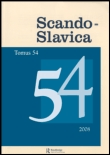
Scando-Slavica
Scope & Guideline
Bridging Cultures: A Journey Through Scando-Slavic Connections
Introduction
Aims and Scopes
- Interdisciplinary Research in Slavic Studies:
The journal encourages contributions that integrate linguistics, literature, and cultural studies, fostering a comprehensive understanding of Slavic heritage. - Historical Linguistics and Morphology:
A significant focus is placed on the evolution of Slavic languages, including phonetic, morphological, and syntactic developments across different regions. - Cultural and Literary Analysis:
Research exploring the cultural narratives and literary expressions within Slavic contexts is a core area, examining how historical and contemporary issues are reflected in literature. - Post-Soviet Studies and Identity:
The journal addresses themes related to post-Soviet identity, nationalism, and the socio-political dynamics of Slavic countries, particularly in the context of modern challenges. - Translation Studies and Language Contact:
There is a notable emphasis on translation practices and the impact of language contact, particularly in multilingual contexts, showcasing how these influence cultural narratives.
Trending and Emerging
- Digital Humanities and Language Studies:
The integration of digital humanities tools and methodologies into Slavic studies is on the rise, facilitating new ways to analyze texts and linguistic data. - Postcolonial and Transcultural Perspectives:
There is an increasing focus on postcolonial studies and transcultural interactions, particularly in examining the legacies of colonialism within Slavic contexts. - Gender Studies and Feminist Approaches:
Research addressing gender dynamics and feminist perspectives in Slavic literature and culture is gaining prominence, reflecting broader global conversations about gender and identity. - Contemporary Political Discourse:
Themes related to contemporary political discourse, especially in the context of nationalism and propaganda in post-Soviet spaces, are increasingly prevalent, highlighting urgent societal issues. - Memory Studies and Historical Narratives:
The exploration of collective memory and historical narratives in literature and culture is emerging as a vital area, emphasizing how past events shape contemporary identity.
Declining or Waning
- Historical Relations of Minor Regions:
Themes exploring the intricate historical relations of lesser-studied regions, such as the Lithuanian-Swedish interactions, have seen less frequent exploration, possibly due to a broader focus on more prominent Slavic narratives. - Early Modern Literature:
Research specifically dedicated to early modern Slavic literature appears to be declining, as contemporary and modern literature gain more attention in scholarly discussions. - Static Linguistic Analysis:
There seems to be a waning interest in purely descriptive linguistic studies without a broader contextual analysis, as researchers increasingly seek to connect linguistic findings to sociocultural phenomena. - Traditional Folklore Studies:
While folklore remains a valuable area of study, specific traditional folklore analyses are becoming less common, as scholars pivot towards contemporary cultural expressions and identities. - Focus on Canonical Authors:
The focus on canonical Slavic authors, while still relevant, is declining as newer voices and underrepresented authors gain traction in literary studies.
Similar Journals

Acta Baltico-Slavica
Engaging with Cutting-Edge Research in Slavic StudiesActa Baltico-Slavica, an esteemed academic journal published by the Polish Academy of Sciences, Institute of Slavic Studies, serves as a vital platform for the exploration of Slavic cultures, languages, and historical narratives. Since its transition to Open Access in 2014, the journal has fostered inclusivity and accessibility, allowing researchers, professionals, and students to engage with cutting-edge scholarship in the fields of History, Linguistics and Language, and Literature and Literary Theory. With a commendable impact as indicated by its category quartile rankings (Q2 in History and Literature, Q3 in Linguistics), and Scopus rankings reflecting its significance within the academic community, Acta Baltico-Slavica not only contributes to the rich tapestry of scholarship surrounding the Baltic and Slavic regions but also encourages interdisciplinary dialogue. The journal’s commitment to advancing knowledge across its fields of study makes it a prominent destination for scholarly discourse and research inquiry.
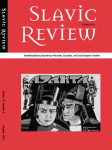
SLAVIC REVIEW
Pioneering Research in the Heart of Slavic Studies.SLAVIC REVIEW, published by Cambridge University Press, is a prominent academic journal that delves into the rich tapestry of Slavic studies, focusing on the cultural, historical, and social dimensions of Slavic regions. With an ISSN of 0037-6779 and an E-ISSN of 2325-7784, this journal holds a significant position within the academic community, ranking in the Q2 category of Arts and Humanities (miscellaneous) and achieving a Q1 rating in Cultural Studies as of 2023. Notably, the journal has consistent relevance in the field, as evidenced by its Scopus rankings—Rank #260 in Cultural Studies and Rank #204 in Miscellaneous Arts and Humanities. Since its converged years starting from 1966 up to the present, SLAVIC REVIEW has been an essential resource for researchers, professionals, and students aiming to deepen their understanding of Slavic cultures. While it operates on a traditional subscription model and does not provide open access, the journal remains a vital platform for pioneering research and critical discourse in Slavic studies.

Studia z Filologii Polskiej i Slowianskiej
Bridging Disciplines in Linguistics and Cultural NarrativesStudia z Filologii Polskiej i Slowianskiej is a prominent journal published by the Polish Academy of Sciences, Institute of Slavic Studies, focusing on the rich and diverse field of linguistics and language studies, particularly within the Slavic context. With the ISSN 0081-7090 and E-ISSN 2392-2435, this open-access journal has been a valuable resource for researchers, professionals, and students since its transition to an open-access model in 2014. It features rigorous peer-reviewed articles that contribute to the understanding of linguistic phenomena and cultural narratives across Slavic languages. Recognized within the Q3 quartile of linguistics and language in 2023, it ranks at the intersection of arts, humanities, and social sciences, providing insights that echo through disciplines such as sociolinguistics, psycholinguistics, and philology. In its ongoing publication trajectory from 2011 to 2023, Studia z Filologii Polskiej i Slowianskiej continues to foster academic discourse and collaboration, positioning itself as a key player in the global linguistic community.
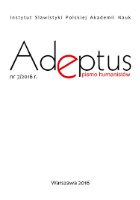
Adeptus
Connecting Scholars, Cultures, and Ideas in Slavic ResearchAdeptus is a pioneering open-access journal published by the Polish Academy of Sciences, Institute of Slavic Studies, specializing in Slavic studies and cultural research. Since its inception in 2014, the journal has aimed to foster scholarly dialogue and advance knowledge across various disciplines related to Slavic languages, literature, history, and sociology. With an ISSN of 2300-0783, Adeptus has positioned itself as a vital resource for researchers, professionals, and students engaged in Slavic studies, offering a platform for high-quality, peer-reviewed articles that explore diverse topics within the field. The journal's open-access model promotes accessibility and dissemination of knowledge, making it a significant contributor to the academic landscape. Located in Warsaw, Poland, Adeptus continues to thrive as a key outlet for innovative research, inviting submissions that embody rigorous scholarship and insightful perspectives.

Mundo Eslavo-Journal of Slavic Studies
Bridging Literature, History, and LinguisticsMundo Eslavo - Journal of Slavic Studies is a prominent journal published by UNIV GRANADA, EDITORIAL, dedicated to advancing the field of Slavic studies through open access scholarship since 2004. With an ISSN of 1579-8372 and an E-ISSN of 2255-517X, the journal aims to provide a platform for interdisciplinary research, covering a wide array of topics including literature, culture, history, and linguistics of Slavic regions. Based in Granada, Spain, this journal is crucial for researchers, professionals, and students seeking to explore and contribute to the understanding of Slavic heritage and contemporary issues. With a commitment to accessibility and scholarly rigor, Mundo Eslavo invites submissions that push the boundaries of conventional discourse in Slavic studies, ensuring that critical insights and diverse perspectives reach a global audience.
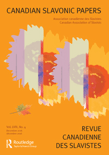
Canadian Slavonic Papers
Cultivating Understanding in Linguistics and LiteratureCanadian Slavonic Papers, published by Routledge Journals, Taylor & Francis Ltd, is an esteemed peer-reviewed journal dedicated to the exploration of the Slavic, Eastern European, and Russian domains, fostering scholarly dialogue across multiple disciplines. With a robust focus on Cultural Studies, History, Linguistics, and Literature, this journal has firmly established its presence in the academic community, as evidenced by its Q1 ranking across various categories in 2023. Since its inception, Canadian Slavonic Papers has been a vital platform for researchers, professionals, and students alike, providing an invaluable repository of knowledge and insights from 1977 to the present. While not an open-access journal, it remains accessible through institutional subscriptions, ensuring a wide dissemination of scholarship. Located in the United Kingdom, the journal continues to contribute significantly to the understanding of Slavic studies within a global context, making it essential reading for anyone invested in this dynamic field.
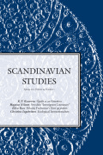
SCANDINAVIAN STUDIES
Unveiling the Rich Tapestry of Scandinavian StudiesSCANDINAVIAN STUDIES is a prestigious journal dedicated to advancing the understanding of Scandinavian languages, literature, and culture. Published by the Society for the Advancement of Scandinavian Studies in the United States, this journal has been a key resource for scholars since its inception in 1974, covering a breadth of topics in both Linguistics and Literary Theory. With an impactful presence within academic circles, it has achieved a notable ranking in the Q2 category for Literature and Literary Theory, and Q3 for Linguistics and Language, ensuring its relevance among leading journals in the humanities. The journal is indexed in reputable databases, including Scopus, where it ranks in the 65th percentile for literature studies. Although it is not open access, SCANDINAVIAN STUDIES provides critical insights and scholarly contributions that greatly enhance discourse in Scandinavian studies. Researchers, professionals, and students alike will find this journal a valuable tool for deepening their understanding of the rich tapestry of Scandinavian contributions to world culture.

WELT DER SLAVEN-HALBJAHRESSCHRIFT FUR SLAVISTIK
Fostering Dialogue in Slavic ScholarshipWelt der Slaven-Halbjahresschrift fur Slavistik is a distinguished academic journal dedicated to the field of Slavic studies, published by Harrassowitz Verlag. With a focus on the rich tapestry of Slavic languages, literature, and cultural theory, this journal provides a vital platform for scholars, researchers, and students interested in the complexities of Slavic linguistics and literary expression. It operates on a semi-annual basis, encompassing converged years from 2002 to 2015 and continuing from 2017 to 2024, ensuring a continuous dialogue in an evolving academic landscape. Despite its Q4 and Q3 rankings in various categories—such as Linguistics and Language, Literature and Literary Theory, and Visual Arts and Performing Arts—its impact is noteworthy, with Scopus ranks that place it within the upper percentiles of arts and humanities fields. While currently not an open access publication, it remains an essential resource for those engaged in the interdisciplinary exploration of Slavic cultures and their global significance. The journal emphasizes innovative research and critical analysis, making it a key contribution to the ongoing discourse in Slavistics.

Studi Slavistici
Illuminating the Intricacies of Linguistics and LiteratureStudi Slavistici is an esteemed academic journal published by FIRENZE UNIV PRESS, focusing on the rich and diverse fields of Cultural Studies, Linguistics and Language, and Literature and Literary Theory. Since its initiation in 2004, it operates under an Open Access model, providing unrestricted access to its contents and fostering a wider dissemination of research. Based in Italy, this journal serves as a vital platform for scholars and researchers engaged in Slavic studies and beyond, encouraging interdisciplinary dialogue and innovative approaches. With its current Quartile rankings in the Q4 category across various domains, it plays a significant role in shaping dialogues within the academic community while offering insights into contemporary and historical perspectives. By maintaining an inclusive vision and engaging with critical issues, Studi Slavistici remains dedicated to advancing knowledge and scholarship in these intricate fields.

Zbornik Matice Srpske za Slavistiku-Matica Srpska Journal of Slavic Studies
Advancing Scholarship in Slavic Linguistics and LiteratureZbornik Matice Srpske za Slavistiku - Matica Srpska Journal of Slavic Studies, published by Matica Srpska in Serbia, is a prominent academic journal focusing on the diverse and rich field of Slavic studies. With an ISSN of 0352-5007 and a commitment to advancing knowledge in linguistics, literature, and cultural contexts, this journal serves as a vital resource for researchers, professionals, and students alike. Although designated as an open access journal, its significance is highlighted by its ranking in the lower quartiles of 2023 across various categories, including Q4 in Linguistics and Language and Q3 in Literature and Literary Theory. The journal's Scopus rankings further reflect its position, with a percentile of just 8th for Language and Linguistics. These factors underscore the journal's ongoing contribution to Slavic scholarship from 2019 to 2024, fostering dialogue and exploration in a field that remains crucial for understanding Eastern European cultures and languages.